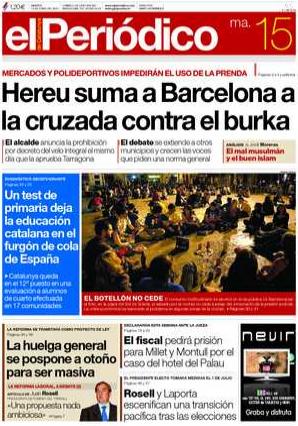Very few Spaniards have ever seen a Muslim woman dressed in a burqa – an all-body veil – walking on local streets.There are no more than an estimated few dozen burqas in the country of 46 million residents, yet the garment has become the object of a heated debate.
Seven municipalities have announced or are considering bans on the burqa, a conservative party is taking the matter to the senate, and some Muslim leaders have vowed to take legal action to reverse the bans. “This is an entirely artificial debate, with political motives behind it,” Encarnacion Gutierrez, secretary-general of Madrid’s Islamic Culture Foundation (FUNCI), told the German Press Agency dpa.
Spain has about 1.3 million Muslims. Most of them are of Moroccan origin. It is not rare for Muslim women in Spain to wear the Islamic headscarf or hijab, which covers the hair. Yet very few of them wear the niqab, a garment covering all but the eyes, and even fewer don the burqa, which includes a semi-transparent veil hiding the eyes.
The burqa, which is worn mainly in Afghanistan, and the niqab are thought to have a pre-Islamic origin. Yet opposition to all-body veils in the West has encouraged some Muslim women to claim them as a sign of their religious identity. In the north-eastern Spanish city of Lleida, for instance, some women reportedly started wearing the niqab after the municipality became the first in Spain to ban all-body veils from public buildings in May.
El Vendrell followed Lleida’s example on Friday, and five other north-eastern municipalities are considering similar bans. Muslim leaders from 11 mosques in the region intend to defend women’s “democratic” right to wear the burqa or niqab at the Constitutional Court.
“I cover myself to feel closer to Allah,” said Zohra Nia, a 38- year-old Moroccan woman who wears the niqab. “My goal is to hide my beauty” from men other than her husband or close relatives, Nia told the daily El Pais in Tarragona, one of the municipalities which are expected to outlaw the burqa and the niqab.
Spain’s main opposition conservative People’s Party (PP) is taking the debate to the senate, which it wants to adopt a motion calling on Prime Minister Jose Luis Rodriguez Zapatero’s government to ban all- body veils from public places. “Most Spaniards regard the use of these garments as being discriminating, harmful and contrary to the dignity of women,” conservative senator Alicia Sanchez-Camacho said. The burqa is also a security issue, because its wearer cannot be identified, she pointed out.
Zapatero’s Socialist government has not taken a clear stance on the issue. Spain does not even have nationwide rules governing the use of the hijab, with some schools allowing pupils to wear it, while others expel girls who refuse to remove it in class.
Gutierrez says she opposes the use of the burqa, but sees bans as doing more harm than good. Debates on subjects such as the burqa could become “explosive” in Spain, which created an “anti-Muslim” Christian identity after expelling the last of its former Muslim rulers in the late 15th century, she said. It was contradictory for Spain to allow women to wear extremely scanty clothing, but to question women’s right to cover their bodies, Gutierrez said.Covering women’s bodies in a sign of chastity is not only an Islamic concept, but forms part of Christianity and other traditions as well, she pointed out.
DPA, 13 June 2010

 Spain’s government plans to ban the use of the Islamic burqa in public places under a proposed new law on religious freedom, the justice minister said Tuesday.
Spain’s government plans to ban the use of the Islamic burqa in public places under a proposed new law on religious freedom, the justice minister said Tuesday.